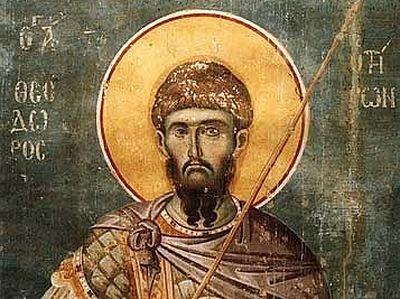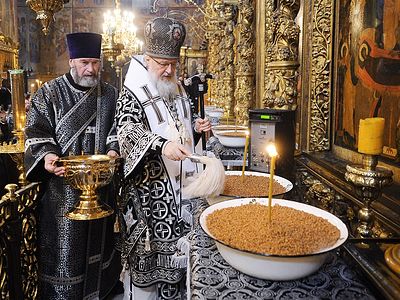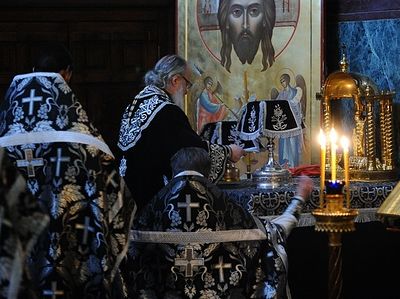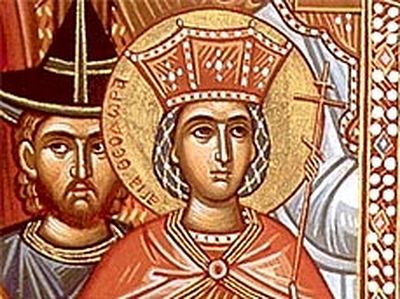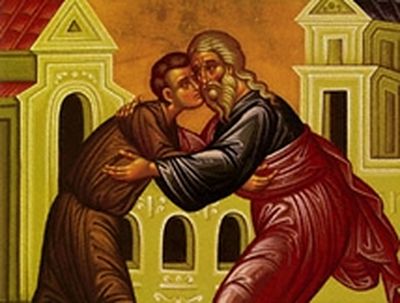True fasting is putting away evil deeds
St. Basil the Great
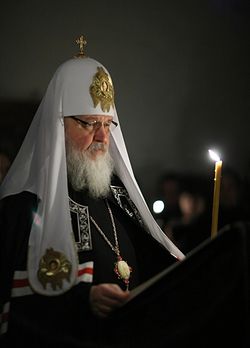
The first week of Great Lent is the strictest. Thus, according to the rule, food is taken only after the Liturgy on Wednesday. Of course, this requirement is relaxed for the sick, infirm, aged, and pregnant or nursing mothers, with the blessing of their spiritual fathers. Nevertheless, even the strictest bodily abstinence without prayer, like a plowed but unsown field, will bring forth nothing but weeds.
During the Great Lenten services we recall the history of mankind’s fall and salvation. Bringing to life before the eyes of the mind the woeful scenes of mankind’s wandering “in a foreign land”, along the “paths of destruction”, the Church allows us to feel more sharply the bitter fruits of sins. In the evenings of the first four days of Great Lent, the Great Canon of St. Andrew of Crete is read in Orthodox churches. This is an inspired work, poured from the depths of the contrite heart of a holy man. Listening to the words of the Canon, the Christian as if once again lives through the life of the whole world, and relates it to his own life. From the depths of the soul, from the depths of the fall, rises the repentant, tearful voice: “Have mercy on me, O God, have mercy on me!” Orthodox Christians always try not to miss these services that have such an amazingly powerful effect on the soul.
Hymns in the first week of Great Lent
“Let us observe a fast acceptable and pleasing to the Lord. True fasting is to put away all evil, to control the tongue, to forbear from anger, to abstain from lust, slander, falsehood and perjury. If we renounce these things, then is our fasting true and acceptable to God.”
“Come eagerly, all ye faithful, and taking as shield the strong armor of the Fast, let us repel every delusion of the enemy. Let us not be led astray by the lusts of passion, let us not flinch before the fire of temptation; and Christ in His love will reward us with crowns for our patient endurance. Offering, then, our prayers with boldness, we fall down and cry aloud, asking for peace and His great mercy on our souls.”
Stichera for Monday of the First Week of Great Lent
“Where shall I begin to weep for the actions of my wretched life? What first-fruit shall I offer, O Christ, in this my lamentation? But in Thy compassion grant me forgiveness of sins.”
“Come, wretched soul, with thy flesh to the Creator of all. Make Confession to Him, and abstain henceforth from thy past brutishness; and offer to God tears of repentance.”
From the Great Canon of St. Andrew of Crete
On fasting
Moreover when ye fast, be not, as the hypocrites, of a sad countenance: for they disfigure their faces, that they may appear unto men to fast. Verily I say unto you, They have their reward. But thou, when thou fastest, anoint thine head, and wash thy face; that thou appear not unto men to fast, but unto thy Father which is in secret: and thy Father, which seeth in secret, shall reward thee openly.
Matthew 6:16-18
True fasting is putting away evil deeds. Forgive your neighbor his offences, forgive him his debts. “Do not fast in judgments and fights.” You may not eat meat, but you devour your brother. You may not drink wine, but you do not refrain from offence. You may wait till evening to take food, but you spend the day in places of judgment.
St. Basil the Great
You are fasting? Feed the hungry, give drink to the thirsty, visit the sick, and do not forget the imprisoned. Console the sorrowing and weeping; be merciful, meek, kind, gentle, long-suffering, not remembering wrongs, reverent, truthful, and pious, so that God would accept your fast and grant you abundant fruits of repentance.
St. John Chrysostom
In these days of the holy Fast, put yourself in order; make peace with people and with God. Weep and have compunction over your unworthiness and peril, and then you will receive forgiveness, and find hope of salvation. A heart that is broken and humbled, God will not despise; and without this, no sacrifices or alms will help you.
From the Letters of Igumen Nikon (Vorobev)
On repentance
If we look deeper into ourselves, then each one will say the words of the prayer: “God, cleanse me a sinner, for I have never done anything good in Thy sight.” These are the words of St. Macarius of Egypt, one of the greatest saints. How can we, wretched sinners, judge and condemn others and in so doing place ourselves higher than them, as their judges? How can we consider those to be on the right path who do not recognized themselves (recognize, and not only in words) to be the greatest sinners of all?
All the work of salvation boils down to the awareness of our own sins, our own unworthiness of the Kingdom of God, and as a result of this, the need to constantly pray to the Lord: “God, have mercy on me, a sinner.” That is how the Lord taught us to pray in the parable of the publican. We are all publicans according to our sins, but we haven’t the publican’s repentance.
Forgetting all our good deeds, we should, like the publican, cry out from our whole heart: “God, be merciful to us, sinners!” And if the publican was justified of all his sins by this prayer alone, then clearly the Lord will have mercy on us also, if we pray from our whole heart and hope in God’s mercy.
With all diligence ask the Lord for the greatest and most needed gift of all gifts—to see your sins and weep over them. Whoever has this gift, has everything.
Make an effort to say the words of the prayer with attention. If you get distracted reproach yourself, open yourself to God, and again force yourself to say the prayer with attention. Then the heart will gradually soften, and at least sometimes will respond with contrition, and maybe even tears.
From the Letters of Igumen Nikon (Vorobyev)

